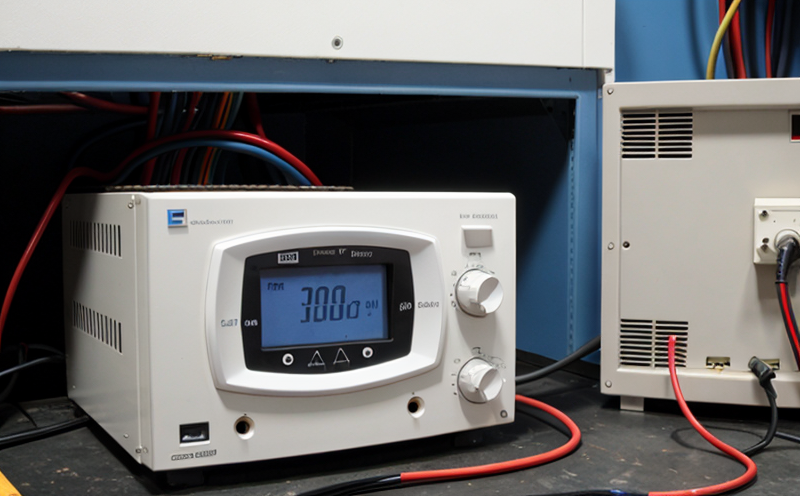Electrical & EMC Testing
The field of electrical and electromagnetic compatibility (EMC) testing is crucial in ensuring that electronic devices perform reliably and safely within their intended environments. This service ensures compliance with international standards, supports product development by identifying potential issues early, and helps maintain a safe environment for users.
At Eurolab, our expertise lies in providing comprehensive electrical and EMC testing services to cater to various sectors including automotive, telecommunications, medical devices, and consumer electronics. Our approach is rooted in a deep understanding of the latest regulatory requirements and best practices outlined by standards such as IEC, EN, and IEEE.
Our team of engineers uses advanced test equipment to assess parameters like voltage stability, current consumption, power factor correction, and interference levels. By adhering strictly to international norms (ISO 14598:2017 for example), we ensure that our tests are accurate and reliable. The results not only help manufacturers meet regulatory standards but also improve the overall quality of their products.
For instance, in automotive applications, EMC testing ensures that vehicle electronics do not interfere with other systems or external signals. In medical devices, it guarantees safe operation without causing harm to patients through electromagnetic emissions. For consumer electronics, compliance with these tests is essential for product safety and functionality.
In addition to standard tests, we also offer custom solutions tailored to specific client needs. This could involve adapting existing protocols to meet unique requirements or developing entirely new test methods. Our flexible approach allows us to support diverse industries while maintaining high levels of quality assurance.
Scope and Methodology
The scope of our electrical and EMC testing services covers a wide range of products, from simple household appliances to complex industrial machinery. We cover both conducted emissions tests (EMI) and radiated emissions tests (RFI), which are essential for ensuring that devices do not produce excessive interference.
- Conducted Emissions: These tests measure the amount of electrical noise or interference generated by a device when connected to power lines. Compliance with IEC 61000-4-2 is critical here as it sets limits on transient, surge, and impulse voltage emissions.
- Radiated Emissions: This type of testing examines how much radio frequency energy a product releases into its surrounding environment. Adherence to IEC 61000-4-3 ensures that devices do not emit harmful levels of radiation.
Our methodology involves several key steps:
- Preparation: We work closely with clients to understand their specific requirements and prepare test specimens accordingly. This may include cleaning, labeling, or making minor adjustments to the product before testing begins.
- Testing: Once prepared, we place the specimen in our state-of-the-art anechoic chambers where it undergoes rigorous evaluation using specialized equipment.
- Data Analysis: After each test run, our data analysts review all collected information to determine whether the product meets specified standards. Any deviations from acceptable limits are carefully documented and discussed with clients.
- Reporting: Finally, comprehensive reports detailing findings and recommendations for improvement or compliance are generated. These documents serve as valuable resources both during development phases and post-production quality control checks.
We pride ourselves on delivering accurate, reliable results that exceed industry expectations. Our commitment to excellence ensures that every client receives top-tier service tailored specifically towards their unique needs.
Eurolab Advantages
At Eurolab, we take pride in offering a range of advantages that set us apart from other laboratories in the industry. Our clients benefit from years of experience combined with cutting-edge technology and methodologies.
- Comprehensive Services: We provide a full suite of electrical and EMC testing services, covering all major markets worldwide including North America, Europe, Asia-Pacific, Latin America, Africa, and Middle East.
- Expertise: Our team consists of highly skilled professionals with extensive knowledge across multiple disciplines. From software development to hardware design, our experts ensure that every aspect of your project receives thorough attention.
- State-of-the-Art Facilities: Equipped with the latest testing facilities and instrumentation, Eurolab guarantees precise measurements and consistent results.
- Custom Solutions: We understand that no two projects are alike. That's why we offer personalized service designed specifically for your unique challenges and goals.
- Rapid Turnaround Times: Leveraging our efficient processes, Eurolab can deliver fast turnaround times without compromising on quality.
- Compliance Support: Our team provides guidance throughout the entire compliance journey, ensuring that you stay up-to-date with changing regulations and requirements.
Choosing Eurolab means choosing a partner committed to excellence. With us by your side, you can focus on innovation while we handle the complexities of regulatory compliance.
Environmental and Sustainability Contributions
- Sustainable Operations: By ensuring that products meet strict electrical and EMC testing requirements early in development stages, we contribute to reducing waste associated with non-compliant designs. This minimizes the environmental impact of faulty or malfunctioning devices reaching marketplaces.
- Eco-Friendly Testing Methods: Our commitment extends beyond just product safety; it includes adopting eco-friendly practices within our own operations such as recycling materials used during testing and reducing energy consumption through efficient use of resources.
We recognize the importance of sustainability in today's global market. Through our electrical and EMC testing services, we help manufacturers design greener products that consume less power, generate fewer emissions, and contribute positively to environmental health.





